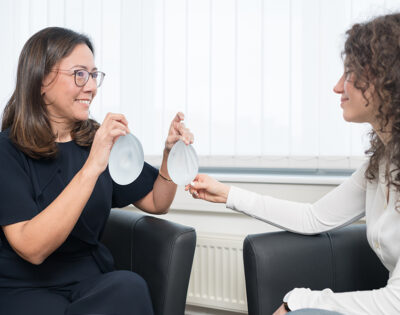Our commitment to excellence: discover our quality standards
The quality of their work is very important to Dr. Adelana Santos Stahl and PD Dr. Stéphane Stahl. Taking responsibility for the quality and safety of patient care is part of the medical self-image at CenterPlast. The quality of a practice is, among other things, the degree of conformity between the requirements of a patient and the service provided. In other words: quality is when you are satisfied. Your satisfaction is our benchmark.
Information, patient information and advice, preparation of the operation, selection of the appropriate anesthesia procedure, hygienic work, professional qualified care according to the respective state of scientific knowledge, patient orientation, patient safety, structuring of treatment procedures are all quality features. Quality indicators are measurable parameters whose characteristics are intended to differentiate between good and poor quality of care, such as a wound infection rate. Assuming good training, the number of operations performed by a surgeon is not a quality indicator (Berger DH, et al. Surgery. 2003). For example, a musician in the Vienna Philharmonic Orchestra and a street musician cannot be compared on the basis of the number of rehearsals or performances. Patients often complain about doctor-patient communication. The time a surgeon spends with his patients outside the operating theater is therefore important.
What our patients say
The search for the right doctor
Obtaining a second medical opinion before making a decision can help to dispel any doubts. The statutory health insurance companies do not cover the costs of aesthetic operations. The treatment costs are relevant to the decision, but trust in the doctor should ultimately be the deciding factor. The training, experience, skills and scientific competence of a doctor are more difficult for a layperson to compare than the costs. Nevertheless, find out about the qualifications of the doctor in whom you are confiding! After all, your health is at stake.
The terms “cosmetic surgeon”, “aesthetic surgeon” or “cosmetic surgeon” are not protected. The situation is different with the professional title of “plastic and aesthetic surgeon”: these doctors have all completed the corresponding six years of further training. This is similar for ear, nose and throat specialists and oral and maxillofacial surgeons; these specialists can acquire the additional qualification “plastic surgery” after two years of further training and are therefore qualified to perform operations in the head area.
Medical work also includes research, for example as part of a medical doctorate or habilitation. The ability to incorporate scientific findings into rational treatment decisions is strengthened through independent scientific activity. Professional experience in a managerial role strengthens the sense of responsibility and the ability to solve complex and difficult challenges.
A comprehensive survey of potentially medically relevant information, a detailed examination and documentation as well as a full explanation of risks and alternatives are evidence of a professional approach. If the doctor uses medical terms that you do not understand, ask about their meaning! If you are afraid of forgetting something that seems important to you, make notes beforehand!
OUR SPECIALISTS
Our experienced plastic surgery specialists


Quality features
In order to be able to objectively assess quality in the healthcare system, the following categories of medical care services are distinguished (modified after Gerlach FM (2001) Qualitätsförderung in Praxis und Klinik. An opportunity for medicine. Thieme, Stuttgart):
- Excellent training and examination of the surgeon according to international standards (e.g. EBOPRAS – European Board of Plastic Reconstructive and Aesthetic Surgery).
- Taking university examinations (the habilitation is the highest-ranking university examination in Germany).
- Regular further training and exchanges with surgeons at international congresses.
- Recognized additional qualifications of the surgeon (e.g. medical quality management, emergency medicine).
- Experience in a leading position (for example as a clinic director).
- Mastery of a variety of surgical techniques (e.g. microsurgery).
- Scientific skills (for example, leading innovative research projects).
- Qualifications and number of employees.
- A modern practice facility.
- A patient-oriented organization of the practice.
- Customer-friendly practice hours (e.g. evenings and weekends)
- Good cooperation with a network of experts.
- Networking with leading international plastic surgeons.
- The surgeon is always available after an operation.
- Friendly and helpful treatment team.
- Appropriate duration of care by the doctor.
- Short waiting times before treatment.
- Timely scheduling of appointments.
- Trusting and attentive discussions with the patient.
- Clear information about the recommended treatment.
- The systematic evaluation of information that affects the risk of treatment (e.g. allergies, thrombosis risks).
- A thorough examination of the patient.
- Comprehensive advice on the benefits and risks of the desired treatment and alternative treatment methods.
- Selecting the appropriate treatment with the patient.
- Treatment according to recognized international fact-based standards.
- Systematic and thorough documentation.
- Thorough preparation for the operation (adjustment of certain medication or nutritional supplements before the operation, ordering compression garments and medication that may be required after the operation, showering with a disinfectant wash lotion on the day of the operation, arranging appointments for follow-up care, taking out follow-up cost insurance).
- The use of checklists to improve patient safety.
- Observing strict hygiene rules.
- Regular check-ups after the operation to identify and treat risks in good time.
- Constant review of performance to identify potential for improvement.
- The improvement or healing of diseases after plastic surgery.
- An improvement in appearance after aesthetic surgery.
- A high level of patient satisfaction.
- Improving the quality of life.
- Positive feedback from patients.
- Positive feedback from referring doctors.
- Low complication rates.
Doctors who participate in SHI-accredited medical care are obliged to introduce and further develop a quality management system (Section 135a (2) no. 2 SGB V).
In addition to his specialist training and meeting the minimum legal requirements, PD Dr. Stahl has acquired additional further training for doctors (additional qualification) in medical quality management.

Personal advice
We take time for you and offer you customized advice and treatment for your individual result.




